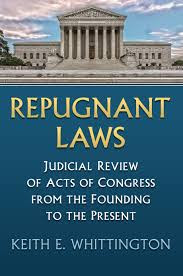A Political History Of Judicial Review
Keith E. Whittington
My thank you lot to Jack for his proffer of a invitee post on my novel mass Repugnant Laws: Judicial Review of Acts of Congress from the Founding to the Present (University Press of Kansas, 2019). Influenza A virus subtype H5N1 post seems especially appropriate since the mass draws on the move of many of the contributors.
Repugnant Laws develops a political history of how the U.S.A. Supreme Court has exercised the ability of judicial review over federal statutes from its founding through the retirement of Associate Justice Anthony Kennedy. The focus is on how the Court has understood the range of the congressional legislative ability in addition to enforced constitutional boundaries against the national legislature over time. It is less a history of constitutional police clit than an exam of how the Court’s move has gibe into the ideology in addition to political needs of national partisan coalitions in addition to whose oxen convey been gored past times how the Court has wielded the ability to strike downward laws. One motivation for the projection is a proffer some years agone past times Mark Tushnet that “judicial review basically amounts to dissonance to a greater extent than or less zero.” In line of piece of occupation amongst others (including some of my before work), he suggested that the courts were “regularly . . . to a greater extent than or less inwards line of piece of occupation amongst what the dominant national political coalition wants.” Repugnant Laws details the extent to which that has been true.
This stance of the Court every bit a political coalition partner reflects a query tradition extending dorsum to Robert Dahl, the peachy political scientist of the mid-twentieth century. Dahl argued that politically appointed justices would to a greater extent than oft than non endure passive observers of what Congress does in addition to could hardly endure expected to endure regular antagonists of Congress or defenders of minority interests against elected majorities. Writing inwards the 1950s, Dahl examined the history of cases inwards which the Court had struck downward an deed of Congress to that betoken in addition to concluded that the Court rarely opposed a alive congressional bulk on a policy of consequence. Dahl was on to something important, but the storey is to a greater extent than complicated than he suggested.
Repugnant Laws examines exactly how much of a coalition partner the Court has been across its history. In the process, it revises our agreement of parts of American constitutional history in addition to of how activist the Supreme Court has been inwards obstructing the elected bulk over time. The Court’s independence has been effectively bounded past times the political needs of elected leaders, but elected leaders oft welcome judicial intervention inwards policy disputes. I convey previously dissected the logic of presidential back upwardly for judicial review, in addition to this mass similarly emphasizes that political leaders oft produce goodness from in addition to welcome judicial activism. Elected politicians produce non human face or desire the Court to only safe postage stamp their legislation, but the Court cannot larn besides much inwards the way. And it has tended to avoid doing so. The Court has been to a greater extent than apt to expand congressional ability than to rein it in.
We are in 1 lawsuit once again hearing calls for an apolitical Court. This is a recurrent fantasy of American political life. The Court has never been apolitical, in addition to it is non almost to croak so. Our politics are partly organized to a greater extent than or less constitutional disputes, in addition to the Court is both a production of in addition to a player inwards that politics. It is difficult to human face at the history of how the Court has assessed the constitutionality of congressional acts in addition to position a fourth dimension inwards which the Court was exterior of politics. We human face judges to remain out of the depression politics of political campaigns, legislative logrolling, in addition to partisan maneuvering for temporary advantage. We cannot reasonably human face them to stand upwardly aloof from the high politics of constitutional debate.
Keith E. Whittington is the William Nelson Cromwell Professor of Politics at Princeton University. You tin make him past times email at kewhitt at princeton.edu

Komentar
Posting Komentar